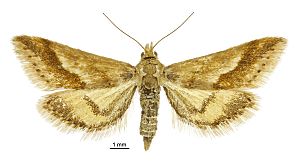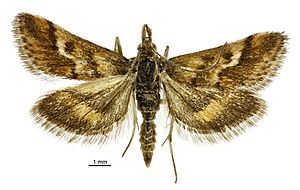Pyrausta comastis facts for kids
Quick facts for kids Pyrausta comastis |
|
|---|---|
 |
|
| Female | |
 |
|
| Male | |
| Conservation status | |
 Nationally Vulnerable (NZ TCS) |
|
| Scientific classification | |
| Kingdom: | |
| Phylum: | |
| Class: | |
| Order: | |
| Family: | |
| Genus: |
Pyrausta
|
| Species: |
P. comastis
|
| Binomial name | |
| Pyrausta comastis (Meyrick, 1884)
|
|
| Synonyms | |
|
|
Pyrausta comastis is a small moth that belongs to the Crambidae family. This special moth is found only in New Zealand, meaning it's endemic there. Because it's quite rare, the Department of Conservation has listed it as "nationally vulnerable," which means it needs protection.
Contents
About This Moth
How Pyrausta comastis Got Its Name
Scientists give every living thing a unique two-part name, like a first and last name. This helps everyone know exactly which species they are talking about.
The Pyrausta comastis moth was first described by a scientist named Edward Meyrick in 1884. He first called it Proteroeca comastis.
Later, another scientist, William Warren, described the same moth in 1892. He thought it was a new species and named it Ennychia intrudens. However, scientists later realized it was the same moth.
In 1928, George Vernon Hudson also wrote about and drew this moth. Today, its correct scientific name is Pyrausta comastis.
What Pyrausta comastis Looks Like
These moths are quite small, usually between 11 and 13 millimeters long. Their bodies are mostly brownish-yellow, often mixed with blackish spots.
Their front wings are long and triangular. They are a pale yellowish-white color, often with reddish-yellow areas. They also have dark lines and spots.
The hind wings are a yellowish-orange color. They have some scattered black scales and a dark line across the middle. There's also a blackish band along the edge of the hind wings.
Where Pyrausta comastis Lives
The Pyrausta comastis moth is found only in New Zealand. It lives in the South Island.
Some places where these moths have been found include Castle Hill and Christchurch. They have also been seen near Lake Rotoiti, Wedderburn, and near Invercargill.
Scientists have also found them in the Mount Cook area and in the Dansey ecological district in Otago. These moths tend to live in higher places, like mountains.
Life Cycle and Behavior
Scientists do not know much about the full life cycle of the Pyrausta comastis moth. This means we don't know details about its eggs, caterpillars, or pupae.
However, adult moths have been seen flying during the months of December and January.
Where Pyrausta comastis Likes to Live
These moths have been found in different types of places. They can live in dry, grassy areas. They also like damp, open habitats.
Protecting Pyrausta comastis
This moth is listed as "nationally vulnerable" under the New Zealand Threat Classification System. This means its population is at risk, and it needs protection to survive.

